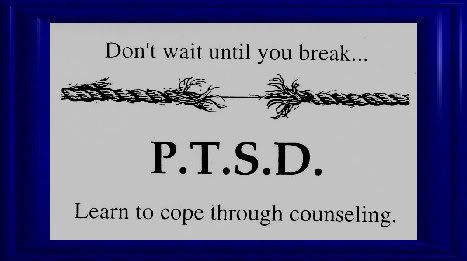In observation of what my son went through with his own personal life, the list below offers a lot of similarities in what else he can be dealing with, or other soldiers for that fact that need to be counseled on. Research has found that certain factors make it more likely that OEF/OIF (Operation Enduring Freedom/Operation Iraqi Freedom) service members will develop PTSD. These factors include:
Longer deployment time: My son had 3 tours in Iraq, lasting over 3 years:
Severe combat exposure, such as deployment to areas close to the enemy - My son had to retrieve vehicles that were blown up by improvised explosive devices (IEDs) and/or seeing others wounded or killed.
Low morale and poor social support within the unit – Psychological differences and lack of support from fellow soldiers.
Family problems – marital issues; going through a divorce
Hispanic ethnic group – Puerto Rican
Other stressors that soldiers may develop but do NOT want to discuss or open up too, causing PTSD in service members:
Combat Stressors | Seeing dead bodies | Being shot at | Being attacked/ ambushed | Receiving rocket or mortar fire | Know someone killed/ seriously injured | |
Iraq | Army | 95% | 93% | 89% | 86% | 86% |
Iraq | Marines | 94% | 97% | 95% | 92% | 87% |
Afghanistan | Army | 39% | 66% | 58% | 84% | 43% |
Mental health effects of serving in Afghanistan and Iraq. (n.d.). United States Department of Veterans Affairs. Retrieved December 16, 2010 from the World Wide Web: http://www.ptsd.va.gov/public/pages/overview-mental-health-effects.asp

No comments:
Post a Comment